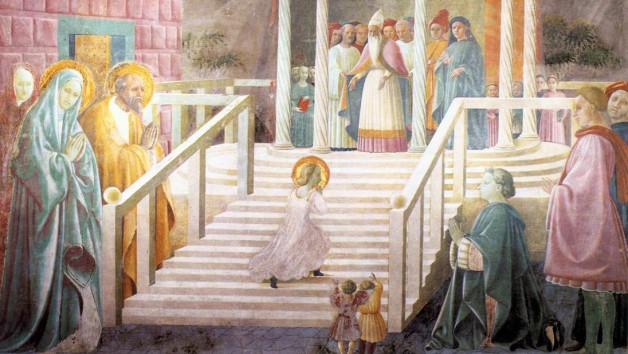Last year my family home became an “empty nest,” and my mother was left to mourn the absence of her children: one son in Phoenix because of work and marriage, another in a medieval religious order, a daughter in her freshman year of college, and, finally, a son in Colorado, indefinitely, because skiing is a mystical experience. Such loss is universal. All through the different chapters of life, each of us must grieve the “going away” of someone we love, someone we shared daily life with, and now, no more.
Today’s feast might rouse similar sentiments.
The Presentation of Mary, not to be confused with the Presentation of Jesus (Lk 2:22–40), is among the lesser known of the Church’s holy days. Tradition has it that, at age three, Mary was presented by her parents to the priests of the Temple in Jerusalem. She was to stay with the Temple virgins, assisting in the liturgical ceremonies until her betrothal to Joseph at age fourteen. (Evidence that such a caste of women existed has been compiled and presented in an excellent post by Dr. Taylor Marshall.)
We might smirk at the ways in which the Church Fathers embellished this story—a metaphysical song of praise by the High Priest Zechariah upon Mary’s arrival, her lodging in the Holy of Holies and fed a daily diet of nectar and ambrosia, and so on—but, even setting these details aside, the idea of such a presentation upsets our twenty-first century sensibilities. What kind of parents would surrender their child at such an early age? Why wouldn’t Mary live at home like the rest of us? Aren’t these stories simply pious legend?
In today’s Gospel (Lk 19:11–28), Jesus himself speaks of a sort of “leaving home,” stirring that ancient sorrow of ours, borne since our first parents were booted from the Garden. He tells a parable in which a ruler gives money to three of his servants to invest, while he himself travels “off into a distant country to obtain the kingship and then return.” Jesus is hinting here at his own departure “into a distant country,” but the people evidently do not understand him. Luke informs us that they “thought that the Kingdom of God would appear there immediately.” While their expectation of his establishment as an earthly Messiah mounts to a frenzy, he journeys in a very different direction—toward his Passover.
Approaching Jerusalem, Jesus stops short and weeps over the city, pronouncing its own destruction with words full of lament (19:41–44). His prophecy would be fulfilled only a generation later, in the Roman siege of 70 A.D. The Christ arrives in the very last chapter of the Temple’s history, just before God’s presence would be uprooted from Judah and scattered to the ends of the earth (Is 49:6). Mary’s presentation can even be said to foreshadow the Temple’s demise. This little girl would one day become the bearer of the Christ, the definitive temple and presence of God among men (Jn 2:19–21; Mt 12:6).
If we stop here, the good news seems rather like the worst news. Life passes away, with its many changes and losses and deaths, and God only exacerbates the problem. Yet, whenever God seems to disappoint our expectations, he really begs for our faith. He has a far deeper and greater plan than we can understand or expect. Instead of setting up a calcified kingdom, a “city on a hill,” populated only by the righteous, God wills that his friends be apostles, ones who are sent. “For the earth shall be filled with knowledge of the Lord, as water covers the sea” (Is 11:9). He doesn’t remove the exilic aspect of human life, but transforms it. Exile and loss become ways in which he reveals himself to all people, and he does the same with all other forms of suffering, even death.
Today provides an interesting context for these thoughts, because it’s “travel day” for the long Thanksgiving weekend. Most of us who live far from the place we called home, try to make our way back for a brief stay, or at least gather with our nearest relatives or friends. For us Dominican friars at the House of Studies, we celebrate Thanksgiving here in our religious home. For all of us, however, the reality remains that our lives will, in one way or another, be continually split apart. We will go on missing family or old friends, and even at times our old selves. All of our reunions only remind us that so much has changed.
But in today’s parable, the ruler does not leave his servants without an “inheritance.” Christ too has gone into a distant country, but has left us himself as an inheritance. He has sent us the Spirit, so that God is not only near us, but within us. Wherever life takes us, we must use this inheritance, always uncovering the face of Christ by seeking him and sharing him. Then, despite our wanderings, God will make us into apostles, and his Church will grow throughout the world, wherever Christians are found. Perhaps he lets us wander far from home, so that he himself might become more our home. Though he says we must lose all else to find him, life seems to take everything from us anyway, and our sorrows can lead us to our savior.
✠
Image: Paolo Uccello, Mary’s Presentation in the Temple







